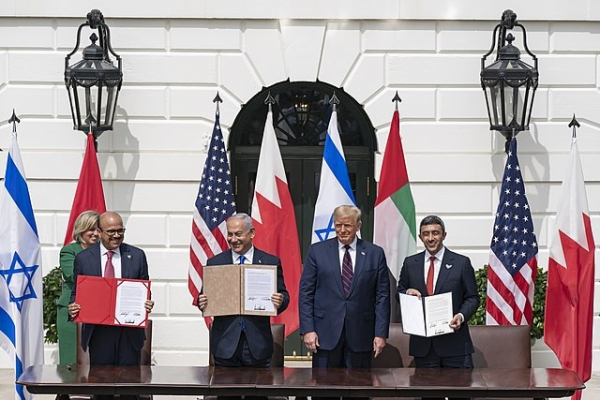
President Joe Biden's administration has forbidden its State Department from using the terms "Abraham Accords" to describe the set of Trump-era agreements established between Israel and the United Arab Emirates, as well as Bahrain in 2020. Brokered by the U.S.' Jared Kushner and Avi Berkowitz, the agreements were signed by Israeli Prime Minister Benjamin Netanyahu, UAE's Foreign Minister Abdullah bin Zayed Al Nahyan, Bahrain's Foreign Minister Abdullatif bin Rashid Al Zayani, and former President Donald Trump.
According to the Washington Free Beacon, the Biden administration has discouraged the use of the terms "Abraham Accords" to refer to these historic peace agreements between Israel and its neighboring Arab countries. Instead, the directive was to refer to them as "normalization agreements."
An insider close to the Biden administration's internal decision-making process leaked the news. Any mention of the words "Abraham Accords" has been scrubbed off any communication from the State Department.
Two leaked internal emails from the State Department showed how the Biden administration instructed employees to only use the term "normalization agreements" to refer to the Abraham Accords. There was no provided reason for the change in language and communication. Senior department officials were also reported to have been tightlipped about the new directive.

This is not new, however, as The Blaze reported such a policy had surfaced in April, when Associated Press diplomatic correspondent Matthew Lee reportedly spoke with State Department spokesman Ned Price, who called the Abraham Accords "normalization agreements." When Lee asked Price what the agreements were called, Price replied "normalization agreements."
When Lee pressed on and asked what their name was, Price said again, "normalization agreements." Lee asked what their "specific name" was, telling Lee, "I believe you know what it is." Lee became visibly uncomfortable despite saying he is "not averse" to using the term "Abraham Accords," later admitting, "We call them normalization agreements."
"We refer to the agreements originally called the Abraham Accords as such," a State Department spokesperson told Arab News. "This administration is not focused on what these agreements are called but what they mean."
Victoria Coates, who served as a senior official at the White House National Security Council under the Trump administration, condemned the Biden administration's move to erase the terms "Abraham Accords" from U.S. history.
"The Biden administration's attempt to diminish and marginalize the Abraham Accords by referring to them as 'normalization deals' is both unfortunate and insidious," Coates argued. "It's a shame to try to undermine such a monumental, historic achievement because it was reached by the previous administration."
Coates argued further that it is wrong to use the term "normalization" because it carries a "regional stigma, particularly with the Palestinians, of being a sell-out."
Former State Secretary Mike Pompeo took to Twitter to criticize the Biden administration's move to prohibit the use of the terms "Abraham Accords" in all official communication. He offered two explanations as to why President Joe Biden would give such an order.
"They can't stand Trump admin successes," Pompeo said. "Or they so despise religious freedom that the faith-driven name we gave to these historic deals upends their anti-religious outlook. Maybe both?"
Biden Admin refuses to refer to our peace deals as Abraham Accords. Only 2 explanations:
1. They can’t stand Trump Admin successes or
2. They so despise religious freedom that the faith-driven name we gave to these historic deals upends their anti-religious outlookMaybe both? https://t.co/JqjYqHNmO6
— Mike Pompeo (@mikepompeo) June 4, 2021

















